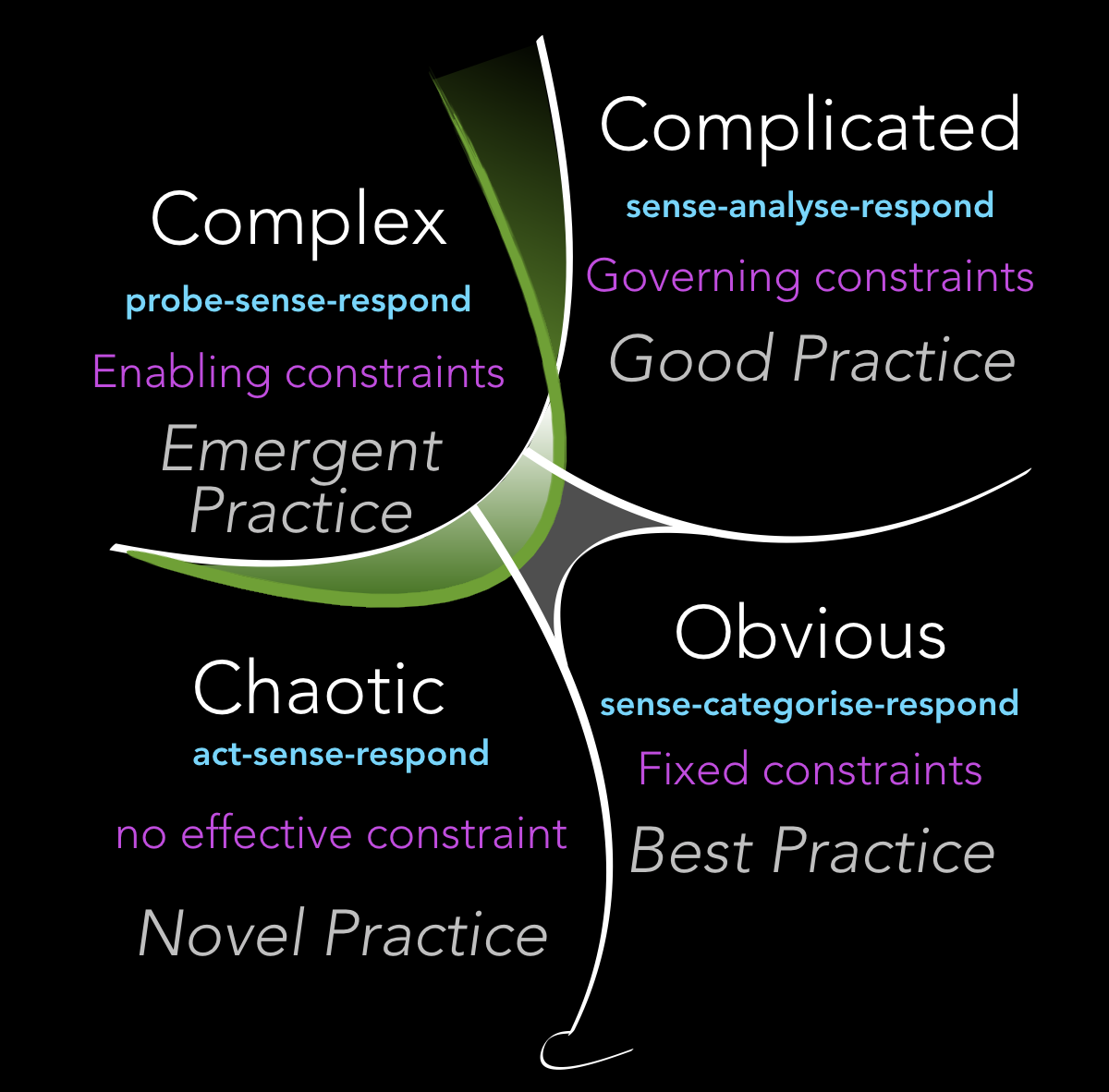In discussions of regenerative agriculture, soil health, and climate change, it's common to encounter these kinds of questions:
What's the best way to measure carbon sequestration in soils?
What practices are best for sequestering carbon in soils?
What are the best indicators of soil health?
How can land managers be incentivized to sequester carbon?
How can we scale up regenerative agriculture?
Given the challenges most humans face, these questions are natural and expected. We're trained to be problem-solvers, which works pretty well in simple or obvious situations, such as fixing a broken door latch: we can trace cause and effect and assign blame. Past experience and expertise is valid, and best practices work well everywhere.
However, with the big issues such as the coronavirus pandemic, systemic racism, climate change, economic inequality, soil health and watershed function--we're not in the simple or obvious situations any more. David Snowden's Cynefin framework helps us ask the question, in what sort of situation or domain are we dealing with, and what might be the constraints and appropriate strategies?

The questions listed above tend to keep us in the problem-solving mode, on the right side, the more ordered side in the diagram above. They may limit our creativity. They may limit participation in the creative discovery of emergent practice, because the problem-solving questions tend to favor experts, and assume that only experts have valid answers. Then the experts become gatekeepers, guarding the problem definitions that fit their expertise, their solutions.
There is enormous momentum (and trillions of dollars of ongoing as well as sunk costs) behind problem-solving approaches to complex issues. Our habits and psychology, our training and education, our political, social, and economic institutions, our departments of agriculture--all contribute to and sustain this momentum. Monitoring landscape and ecosystem function becomes a kind of surveillance in service of rule-based and problem-solving systems of compliance, certification, prediction, or judgment.
Opportunity- and possibility-seeking has been the purpose and design of the Soil Carbon Challenge. But it lacks a local focus, which is critical to growing a shared intelligence on ecosystem function. I'm working to complete a first version of soilhealth.app (estimated for July 2020). This will succeed atlasbiowork.com: enabling good, opportunity- and possiiblity-seeking questions, but with locally-specific projects that can be configured differently so as to promote a shared intelligence on both ecosystem and economic function, and the partitioning of sunlight and human power.
| Common questions | better questions |
| Am I doing the right thing? | What results am I getting? |
| Is this species or practice good or bad? | What work does it do, and how does it function in the larger system? |
| How do I kill this weed or get rid of this person? | What conditions can I begin to create so that this weed or person is no longer a problem? |
| What best management practices are commonly associated with accomplishing X, and which appeal to me? | What conditions might enable X to occur? What position do I need to be in, what behavior and belief do I need, for X to begin to occur? |
| How can we make this [leaky, ineffective] system more efficient? More benign? | How might we create an effective system for what we need and want? What might be some safe-to-fail experiments that might show us the way? |
soilhealth.app (a third generation data collection and visualization platform) will be free to use for projects with open data, but each project will require human facilitator/coordinator(s) to engage their community in sharing evidence-based monitoring data and facilitating participation and interpretation, the questions on the right. The purpose is to enable good questions, and engage more people in asking and answering them. Contact us if you're interested in starting or facilitating a local monitoring project.
Complex relationships and a double pendulum
Our systemic issues--racism, climate, economic inequality--involve complex relationships and the transfer of energy and power. The double pendulum offers a reflection:
Recent Posts
Archive
Categories
- Events (2)
- policy and framing (22)
- ruminations (3)
Tags
- atlas (2)
Authors
- Peter Donovan (135)
- Didi Pershouse (3)